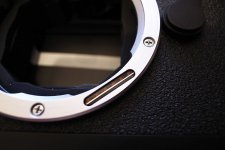Andy Aitken
Registered Loser
I've noticed that my M8's 6 bit sensor looks quite different from the pictures I've seen of other M8's. My one has a thin metallic strip running along it and I'm wondering what this is, if it should be there or if it is simply a production upgrade.
It wouldn't bother me other than that I've been fiddling around trying to "fool" the sensor into recognising my Kobalux 21mm f2.8 as a Leica 21mm f2.8 with black marker on the LTM-M adapter (as described online) without success. I don't have any 6 bit lenses and am unlikely to be having any any time soon and, while I don't notice any problems with my non-Leica wides I'd now just like to ensure the sensor is working properly. And yes I did remember to enable it in the menu.
Does anyone else have a sensor that has the metal strip and that works fine? hopefully a picture of it can be seen here...
Thanks
It wouldn't bother me other than that I've been fiddling around trying to "fool" the sensor into recognising my Kobalux 21mm f2.8 as a Leica 21mm f2.8 with black marker on the LTM-M adapter (as described online) without success. I don't have any 6 bit lenses and am unlikely to be having any any time soon and, while I don't notice any problems with my non-Leica wides I'd now just like to ensure the sensor is working properly. And yes I did remember to enable it in the menu.
Does anyone else have a sensor that has the metal strip and that works fine? hopefully a picture of it can be seen here...
Thanks


